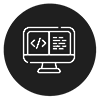Towards Data Driven Usability Engineering in an Automotive Software Factory
Automotive industry is currently preforming a radical change from mechanical cars with E/E components towards Software Defined Vehicles. One mayor change and challenge is the shift to constant software evolution over the complete lifecycle of a vehicle, starting with vehicle platform design till taking cars to the scrap yard. DevOps principles and mindset are an important enabler for providing constant updates on vehicle software. On the other side, we see also a seamlessly integrated development environment tool chain, e.g.

Web & Desktop Tools & IDEs